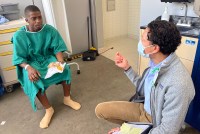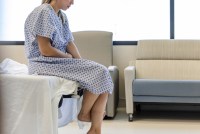Latest KFF Health News Stories
‘An Arm and a Leg’: Checking Up on California’s DIY Insulin Project
California put up $100 million to produce its own insulin. How did this plan come to be, and what might stand in the state’s way?
As Giant Hospitals Get Bigger, an Independent Doctor Feels the Pinch
Independent medical practices keep closing as doctors join behemoth hospital groups or leave the field. Research suggests that’s bad news for patients. Studies repeatedly conclude that consolidation in the health care industry is driving up costs while showing no clear evidence of improved care.
BMI: The Mismeasure of Weight and the Mistreatment of Obesity
The human body mass index — a simple mathematical equation — is tied to a measure of obesity invented almost 200 years ago. On the downside, it can stand between patients and treatment for weight issues. It particularly mismeasures Black women and Asians.
Climate Change Magnifies Health Impacts of Wildfire Smoke in Care Deserts
Smoke- and ash-filled air can trigger or exacerbate severe respiratory conditions. But the medical specialists who treat these illnesses are often scarce where they are most in need.
‘Separate and Unequal’: Critics Say Newsom’s Pricey Medicaid Reforms Leave Most Patients Behind
MLK Community Hospital in South Los Angeles is surrounded by poverty, homeless encampments, and food deserts. Even though California Gov. Gavin Newsom is funneling billions of taxpayer money into an ambitious initiative to provide some low-income patients with social services, hospital executives and other critics say it won’t improve access to basic care.
Abortion Bans Are Motivating Midterm Voters, Poll Shows
A new KFF poll shows Democrats and those living in states where abortion is illegal say the issue has made them more motivated to vote. It also shows that 70% of Republicans oppose total abortion bans.
Watch: What Experts Advise for Seniors Living Under the Long Shadow of Covid
For older people, the pandemic is as taxing and worrisome as ever. Experts in geriatric care, mental health, social services, and infectious disease joined a KHN-Hartford Foundation panel to talk about a third covid winter and its outsize toll on seniors.
Miami’s Little Haiti Joins Global Effort to End Cervical Cancer
Creole-speaking public health workers teach women how to test themselves for HPV, the virus that causes some cervical cancers.
If You’re Worried About the Environment, Consider Being Composted When You Die
The idea of human composting — to help restore a forest or grow flowers — may be a little off-putting to some, but it has many advantages over traditional-but-toxic methods of burial and cremation.
Hospitals Have Been Slow to Bring On Addiction Specialists
Hospitals have specialists ready to offer consult and care for concerns from cancer to childbirth but often no one with expertise in addiction medicine. Patients with a history of substance use — who are discharged without care — are at risk for overdose.
Photographer’s 12-Year Quest to Document Her Life Produces a Rich Portrait of Aging
Twelve years ago, Marna Clarke was seized by a desire to examine what she looked like at age 70 — and to document the results. This creative project has sustained and engaged her since.
Abortion Bans Skirt a Medical Reality: For Many Teens, Childbirth Is a Dangerous Undertaking
The laws criminalizing abortion in many conservative U.S. states are expected to boost birth rates among teens, whose bodies often aren’t built for safe childbirth. For adolescents, the emotional and physical challenges of carrying a pregnancy to term can be daunting.
As the Deadline Creeps Up, Submit Your Scariest Halloween Health Haikus
Submissions are open for KHN’s fourth annual Halloween Haiku competition. Send us your best scary poems — if you dare.
Hurricane Ian Shows That Coastal Hospitals Aren’t Ready for Climate Change
Hundreds of medical centers along the Atlantic and Gulf coasts face serious risks from even relatively weak storms as climate change accelerates sea-level rise — not to mention big ones like Category 4 Hurricane Ian.
KHN’s ‘What the Health?’: Looking Ahead to the Lame-Duck Session
Congress won’t be back in Washington until after Election Day, but lawmakers have left themselves a long list of items to finish up in November and December, including unfinished health care policies. Sandhya Raman of CQ Roll Call; Jessie Hellmann, also of CQ Roll Call; and Mary Agnes Carey of KHN join KHN’s Julie Rovner to discuss these topics and more. Also this week, Rovner interviews KHN’s Sam Whitehead, who reported and wrote the latest KHN-NPR “Bill of the Month” episode about a family who tried to use urgent care to save money, but ended up with a big emergency room bill anyway.
Medical Debt Sunk Her Credit. New Changes From the Credit Reporting Agencies Won’t Help.
New policies to prevent unpaid medical bills from harming people’s credit scores are on the way. But the concessions made by top credit reporting companies may fall short for those with the largest debt — especially Black Americans in the South.
Listen: Medical Bills Upended Her Life and Her Credit Score
Penny Wingard, 58, of Charlotte, North Carolina, worries she won’t ever get out from under her medical debt despite new policies that are supposed to prevent medical debt from harming people’s credit scores.
Addiction Experts Fear the Fallout if California Legalizes Sports Betting
If California voters approve one or both sports-wagering initiatives on the November ballot, psychiatrists anticipate more cases of problem gambling and gambling addiction. They’re especially concerned about online betting, a very addictive way to play.
$80,000 and 5 ER Visits: An Ectopic Pregnancy Takes a Toll Despite NY’s Liberal Abortion Law
If an embryo has implanted in a fallopian tube, ending the pregnancy is imperative to protect the patient’s life. Women’s health advocates have raised concerns that the needed treatment may be hampered by restrictive abortion laws in some states. Yet women seeking treatment in states with more liberal abortion laws may still find the process expensive and harrowing.
Nursing Home Surprise: Advantage Plans May Shorten Stays to Less Time Than Medicare Covers
Private Medicare Advantage health plans are increasingly ending coverage for skilled nursing or rehab services before medical providers think patients are healthy enough to go home, doctors and patient advocates say.


























